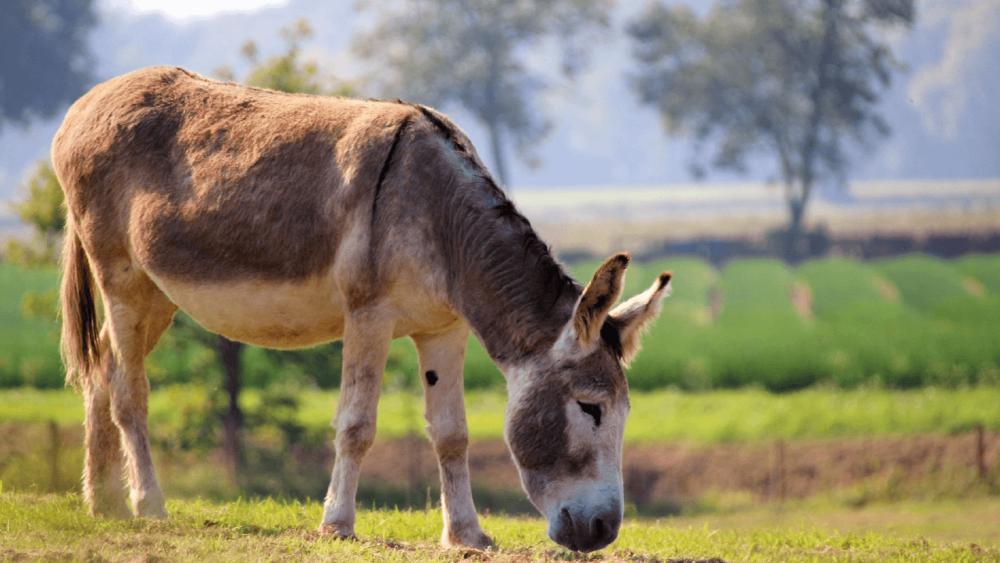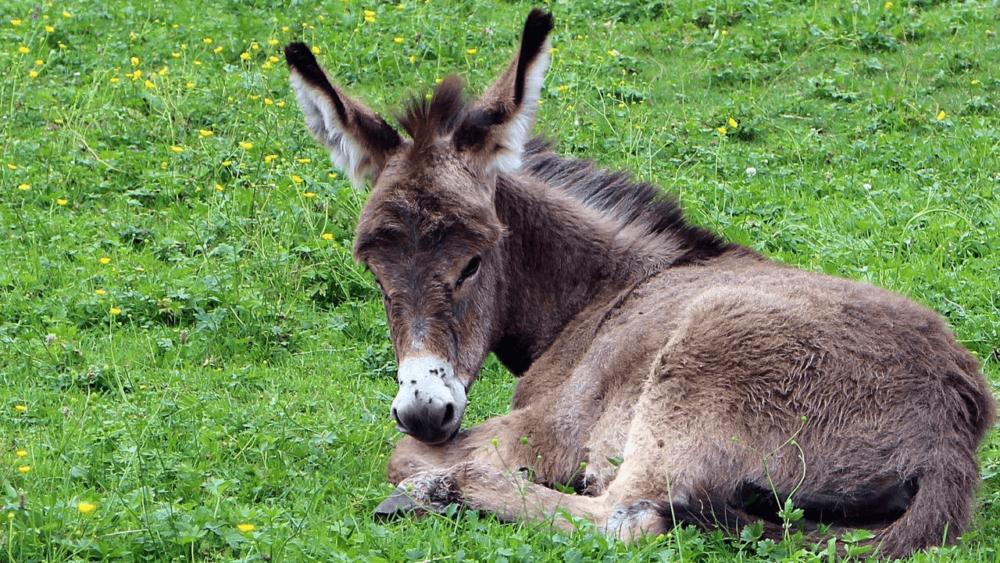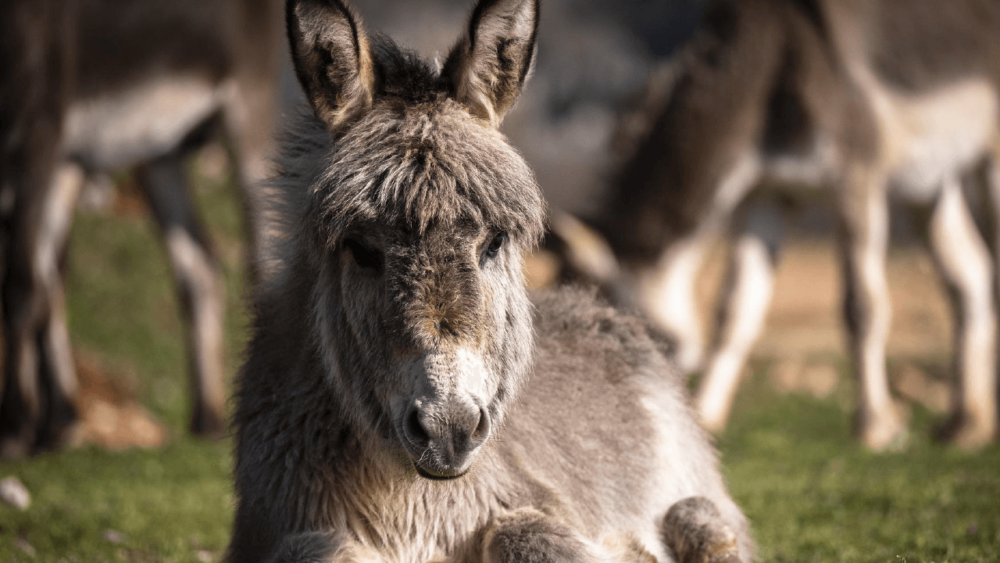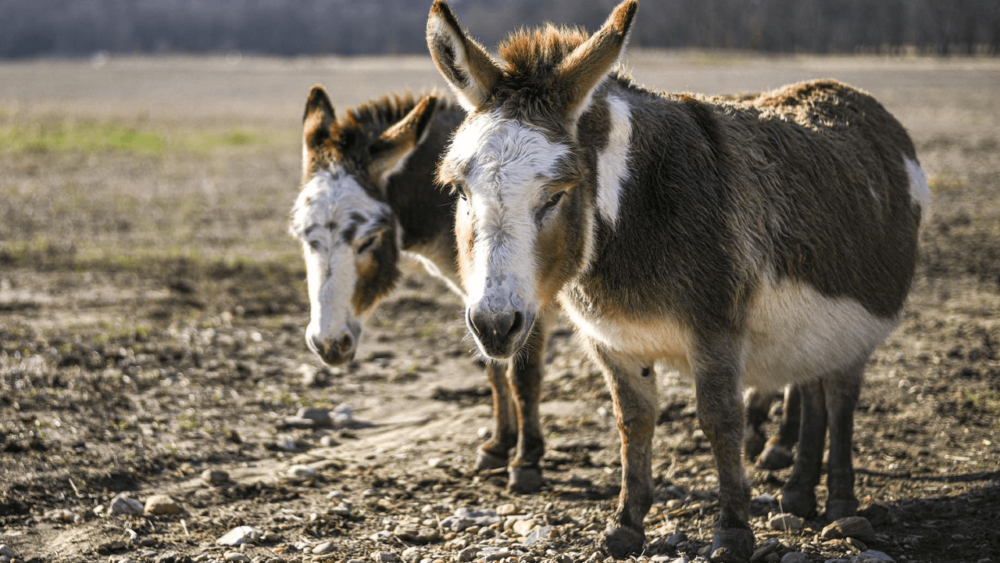Donkeys are fun to have around and make excellent companions. Not only can they keep alpacas company, but they can also guard sheep and entertain ponies and children!
Having descended from the desert-dwelling wild ass, the donkey is generally healthy, low maintenance, and resilient against many diseases and illnesses.
Why does my donkey look dull? Donkeys are generally stoic animals so if your’s looks a little due, they could be suffering from a dangerous health issue. The most common problems affecting donkeys are colic, laminitis, respiratory disease, dental problems, Equine Cushing’s Disease, and Equine Metabolic Syndrome.
These conditions can cause a donkey to lie down and may require immediate treatment. Here, we’ll cover the symptoms of some of the most common and dangerous health issues for donkeys and the necessary steps to prevent and treat these problems.
Warning Signs Your Donkey Has Health Issues
Diagnosing donkey health problems is the first step toward treating them effectively. If you know what health issue you’re dealing with, you can also work out what steps to take to treat it effectively. Look out for these and other warning signs to tell if your donkey is in trouble:
- Dullness
- Lying down and won’t get up
- Rapid breathing
- Coughing
- Pawing the ground or stomping
- Nasal discharge
- Lack of appetite
- Lethargic or unresponsive
- Sweating
- Grinding teeth
- High temperature
- Discomfort when urinating or frequent urination
If your donkey shows any of these symptoms, he could be suffering from one of the following health issues:
#1 Colic is a Serious Health Issue that Impacts your Donkey’s Survival
Colic isn’t an illness in itself but a symptom of abdominal pain. There are many different types and causes of colic. Causes include blockages in the intestine, a build-up of gas, twisting of the intestine, muscle spasms in the intestinal wall, and stomach ulcers.
Regardless of what causes colic, it is a potentially fatal health condition that needs immediate treatment. Veterinarians will usually focus on restoring the donkey’s normal gut function and hydration and reducing pain.
In less severe cases, analgesics and intravenous fluids may be sufficient to treat the problem. In more severe instances, this condition may require surgery. An acute case of colic usually occurs when:
- The colic has gone on for several hours
- The veterinarian detects the presence of distended intestines
- Reduced gut sounds
- The donkey is in severe or unrelenting pain
Colic in donkeys is more challenging to treat than it is to prevent. You can reduce the risk of colic by:
- Feeding the best forage food for donkeys
- Introducing any dietary changes gradually over two to four weeks
- Avoiding moldy food
- Controlling your donkey’s access to rich grazing
#2 Worms can Make your Donkey Dull and Weak
Donkeys host a variety of worms, including gastrointestinal parasites and lungworms. We’ll discuss the latter in the section on respiratory problems. It’s virtually impossible to ride a donkey of all gastrointestinal tract parasites. But it’s also critical that you keep their numbers under control. A heavy parasitic burden can cause:
- Weakness and lethargy
- Loss of appetite
- Weight loss
- Anemia
- Rough or discolored coat
- Diarrhea
- Colic
Donkeys are most commonly affected by Ascaris, pinworms (Oxyuris equi), Strongyles, and tapeworms.
You can prevent and treat parasitic infestations by adopting a regular worm control routine. The best dewormers for donkeys come in various forms, including gels, pastes, tablets, and liquids. You can administer most of these orally, although some require subcutaneous injection.
The best dewormers for donkeys are:
Deworm your donkey every six to eight weeks. Or, perform a fecal egg count and administer a dewormer only if your donkey has a count of 200 eggs per gram or higher.
#3 Common Respiratory Problems to Watch for in Donkeys
Donkeys don’t have a strong cough reflex, which makes identifying and diagnosing respiratory issues more challenging than it is in horses.
If your donkey is coughing, chances are he’s contracted one of the following respiratory problems:
- Lungworm
- Equine Influenza
- Equine Herpes Virus
- Strangles
A veterinarian can treat most of these problems relatively easily. But identifying the issue can be challenging. Although donkeys are more susceptible to lungworm infestations than horses, they rarely exhibit clinical symptoms.
Carefully monitor any changes in your donkey’s behavior, and contact a veterinarian if you have any concerns. An early diagnosis gives a coughing donkey the best chance of survival.
You can learn more about common respiratory issues in our article on donkey coughing.
#4 Donkeys are Prone to Weight Gain and Laminitis
Donkeys have adapted to survive in harsh, arid conditions. The rich grasses and damp conditions prevalent throughout the US are not its natural habitat and present specific challenges. A diet high in starch and sugar makes your donkey susceptible to weight gain. That in turn, puts him at risk of developing laminitis.
This painful disease causes inflammation in the laminae. These tissues join the hoof wall to the bone inside. As the laminae swell up, they stop providing the pedal bone with the support it needs. This causes extreme pain and is often irreversible.
Laminitis is much easier to prevent than it is to cure. Providing the best forage food for donkeys can help maintain a healthy weight and provide your donkey with the high fiber and low-sugar diet he needs.
Prompt diagnosis and early treatment will also limit the damage and ensure a more favorable prognosis.
#5 Donkeys are at High Risk of Developing Hyperlipidemia
Hyperlipidemia occurs when a donkey has too many lipids, or fat particles, in its bloodstream. Insulin-resistant donkeys are more prone to developing this condition. Pregnant donkeys experiencing an increase in their nutritional needs are also more susceptible.
As it causes organ failure, hyperlipidemia is both severe and potentially fatal. Prompt and aggressive treatment is the best way to maximize your donkey’s chances of survival. Therefore, we recommend calling a veterinarian at the first sign of illness. These include:
- Loss of appetite
- Depression
- Lethargy
- Rapid breathing
- Congestion
- Reddening of the gums
A veterinarian will usually treat the problem with a course of anti-inflammatories, fluid therapy, and, potentially, nutritional support.
You can reduce the risk of your donkey developing hyperlipidemia by minimizing stress, monitoring and maintaining your donkey’s weight, and providing shelter in bad weather.
#6 Valuable Tips on Preventing Dental Disease in Donkeys
Studies show a high prevalence of dental disease in donkeys. Common dental issues such as diastemata, displaced teeth, and wave mouth can cause extreme pain, weight loss, and colic.
Unfortunately, donkeys are so stoic that they rarely display symptoms of dental disease in the way that horses do. Instead, Amy McLean, an equid lecturer at the University of California, recommends that donkey owners look for more subtle signs of discomfort.
According to her, donkeys with a toothache may “flatten their ears, tilt or shake their heads, and move their upper lips.” Alternatively, they may “pack food in their mouths” or yawn frequently.
Rather than waiting for signs of dental problems, donkey owners schedule regular checkups. During that, a professional can check for signs of wear and tear, new growths, and structural abnormalities.
#7 Donkeys can get Arthritis in their Joints, Hooves, and Legs
Arthritis is common in older animals, especially those that spend most of their lives on the move like donkeys do. Aged donkeys, over 20 yrs old, are particularly susceptible to arthritis. They may need long-term supplementary treatment to keep them mobile and comfortable.
In addition to old age, infection, injury, and malnutrition can all contribute to arthritis. The most common symptoms of arthritis included localized stiffness, inflammation, heat, and pain.
Veterinarians will usually prescribe donkey-approved anti-inflammatories, such as Phenylbutazone. Or they may prescribe a more long-term approach designed to repair joint cartilage and reduce inflammation.
You can make your donkey more comfortable by making sure his food and water are easy to reach and digest. Give him deep, comfortable bedding to prevent pressure sores if he’s lying down more than usual.
#8 How to Diagnose and Treat Equine Cushing’s Disease in Donkeys
Equine Cushing’s or Pituitary Pars Intermedia Dysfunction (PPID) usually affects older horses and donkeys. A tumor forms in the donkey’s pituitary gland, distributing the signals it sends to the rest of the body. The donkey’s system responds by producing excess hormones, primarily the stress hormone known as cortisol.
PPID isn’t easy to diagnose, and signs of the condition are slow to materialize. It would be best if you asked a veterinarian to look at any donkey that shows signs of:
- Weight loss
- Mouth ulcers
- Excessive thirst
- Abnormal urination
- Unusual shedding patterns
- Laminitis
There is no cure for Equine Cushing’s disease. Your veterinarian can recommend ways to manage it and prevent the symptoms from worsening. You will also need to keep your donkey’s environment clean to reduce the risk of infection. His immune system is compromised. A donkey with PPID also requires a special diet that reduces the risk of laminitis while preventing weight loss.
You can reduce the risk of your donkey developing PPID by maintaining a strict diet and exercise regime.
#9 Regular Exercise can Prevent Equine Metabolic Syndrome in Donkeys
Domesticated donkeys evolved from animals that adapted to live in resource-poor environments. As a result, they are often exposed to more feed than they require.
When combined with limited exercise, this can reduce a donkey’s ability to lose weight and regulate insulin. Both are symptoms of Equine Metabolic Syndrome (EMS). EMS makes a donkey more prone to obesity and incapable of regulating insulin levels. This combination increases the risk of laminitis.
While there is no known treatment for EMS, weight loss will help. A high-fiber, low-starch diet combined with a regular exercise regime can help prevent the condition from developing and stop the symptoms from worsening.
#10 Donkeys are also Prone to Viral Infections
While many think of donkeys as more resilient and less susceptible to the viral infections that affect horses, this isn’t always the case. Donkeys are just as prone to contracting some equine viruses as horses are. They can contract infectious anemia (EIA), encephalomyelitis, herpesvirus (EHV), and equine influenza (EI). African horse sickness can also affect donkeys, as can rabies. A regular vaccination program can prevent most of these conditions.
Prevent the Most Dangerous Health Issues for Donkeys
Feed only the best forage food for donkeys
Donkeys need a high-fiber diet that’s low in starch and sugar. A mixture of hay and barley straw works well for most donkeys, whereas high-energy feeds like alfalfa can cause obesity, laminitis, and EMS.
Make dietary changes gradually
If you need to move your donkey to a new pasture or remove him from one that’s too rich, make the change gradually over a couple of weeks. This routine will reduce the risk of colic by allowing the microbes in your donkey’s stomach to adapt.
Never give your donkey moldy food
Moldy hay contains dangerous spores that can cause respiratory problems in donkeys. A donkey may also colic after eating moldy hay.
Restrict your donkey’s access to rich grazing
The donkey’s digestive system is designed for arid environments. Fresh, green grass is too rich for a donkey and contains too much sugar and starch. A donkey on fresh pasture 24/7 will soon become obese, increasing his risk of other conditions, including laminitis and EMS.
Maintain a regular exercise regime
Regular exercise will help you manage your donkey’s weight and reduce the risk of arthritis in older animals. It doesn’t matter whether you choose to take your donkey for a walk, play games with him, or enrich his environment, so he exercises himself – you’ll have a happier, healthier donkey for your efforts. Check out our article on Best Donkey Toys and Games to Play and Entertain Your Donkey for more ideas.
Deworm your donkey every eight weeks
Regular deworming will help control your donkey’s parasitic burden. While he will never be completely free of parasites, administering an oral dewormer every eight weeks will control the population and keep your donkey healthy.
Clean your donkey’s enclosure regularly
The larvae of many internal parasites develop in manure or feces. If you remove the feces, you also remove one of the parasite’s critical habitats, breaking its life cycle. This approach can help control parasite populations and reduce your donkey’s risk of lungworm and other conditions associated with parasites.
Get your donkey’s teeth checked twice a year
Dental problems can be excruciating for a donkey and cause him to lose weight. The best way to prevent these issues is by having an equine dentist perform routine checkups.
Monitor your donkey’s appetite and energy levels
Observe your donkey’s behavior daily; that way, you’ll be familiar with his usual levels of activity and quicker to discern any drop in appetite or energy levels.
Avoid over-crowding
Avoid-crowding can cause stress, increase the parasitic load, and make your donkeys more susceptible to disease. Over-crowded enclosures are also tricky to keep clean.
Conclusion
It can be challenging to tell if a donkey’s feeling unwell as they are stoic animals that rarely show signs of pain or discomfort (unlike the melodramatic horse!) Therefore, as donkey owners, we need to be on the lookout for any signs that our donkeys aren’t feeling well.
Early diagnosis is the donkey’s best chance of survival. Of course, prevention is always better than cure. Adopting a good management regime is the best way to keep your donkey and reduce his risk of developing dangerous health conditions.
My Favorite Equine Resources For Horses and Donkeys
This list contains affiliate products. Affiliate products do not cost more but helps to support BestFarmAnimals and our goal to provide farm animal owners with accurate and helpful information.
Squeaky Chicken Toy is hilarious to watch and the horses love it! It’s not super tough so keep it away from dogs.
Dewormer with Ivermectin: I use this for my horses and my goats. Duvet makes a great dewormer. I switch between the Ivermectin one and one like this one so the worms don’t get immune to it.
Manna Pro Apple Flavored Nuggets are a delicious smelling treat that my horses go crazy over.
Equinity Amino Acid Supplement for Horses makes a big difference for any horse that’s struggling with arthritis, hoof issues, or just generally. It’s great for older horses who can’t absorb all the nutrients in their food as well!
Manna Pro Weight Accelerator helps older horses gain weight and stay healthier! This was especially helpful when one of my older horses lost weight over the winter and helped her regain her weight over the summer!
Farnam Fly Control goes on the horse or donkey and will keep the flies off your sweet pet. It makes horses way more comfortable and will keep sores from getting infected as well.
Wound Kote protects sores and wounds. It acts as an antiseptic and helps wounds heal faster. It works on both my horses and goats.




